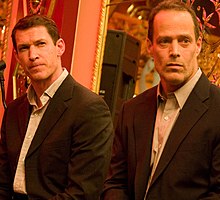Sebastian Junger
Sebastian Junger (born January 17, 1962) is an American journalist, author and filmmaker who has reported in-the-field on dirty, dangerous and demanding occupations and the experience of infantry combat.
He is the author of The Perfect Storm: A True Story of Men Against the Sea (1997) which was adapted into a major motion picture and led to a resurgence in adventure creative nonfiction writing.
Junger's works explore themes such as brotherhood, trauma, and the relationship of the individual to society as told from the far reaches of human experience.
[6] Junger graduated from Concord Academy in 1980[8] and received a bachelor of arts degree from Wesleyan University in cultural anthropology in 1984.
[15] With British photographer Tim Hetherington, Junger created The Other War: Afghanistan, produced with ABC News and Vanity Fair.
[17][18] Junger, along with Hetherington, used material gathered in the Korengal Valley of Afghanistan for the book and to create a related documentary feature Restrepo.
On April 27, 2011, Junger was presented with the "Leadership in Entertainment Award" by Iraq and Afghanistan Veterans of America (IAVA) for his work on Restrepo.
It recounts a storm in October 1991 that resulted in the Gloucester fishing boat Andrea Gail going down off the coast of Nova Scotia, and the loss of all six crew members: Billy Tyne, Bobby Shatford, Alfred Pierre, David Sullivan, Michael Moran and Dale Murphy.
In 2000, the book was adapted by Warner Brothers as a film of the same name, starring George Clooney and Mark Wahlberg.
He developed this project as The Perfect Storm, as he became more involved with learning about the crew members and the conditions and decisions that contributed to their deaths.
[31] Junger established The Perfect Storm Foundation to provide cultural and educational grants to children across the country whose parents make their living in the commercial fishing industry.
The prosecution called witnesses who remembered seeing Smith chiefly because he was a black man walking in a predominately white neighborhood.
Smith had cleaned Goldberg's house the day she was attacked and left a receipt (for his work) with his name on her kitchen counter.
[35] Defense attorney Alan Dershowitz said in his review of the book: It "must be read with the appropriate caution that should surround any work of nonfiction in which the author is seeking a literary or dramatic payoff."
He noted that Junger did not include endnotes or footnotes, and suggested he may have had too much interest in "playing down coincidences and emphasizing connections.
"[44] Restrepo, which premiered on the opening night of the 2010 Sundance Film Festival,[45] won the grand jury prize for a domestic documentary.
[48] The visits from June 2007 to June 2008 to eastern Afghanistan to the Korengal Valley with Tim Hetherington resulted not only in their reports and pictures published in Vanity Fair in 2008 and the film Restrepo (2010), but also in Junger's best-selling book War (2010),[3] which rewrites and expands upon his Vanity Fair dispatches.
His actions during the fighting in the Korengal Valley made him the first soldier to still be alive when receiving the Medal of Honor since the Vietnam War.
Brendan O'Byrne, who appeared in the film Restrepo, US Army soldier David Roels, and Spanish photo-journalist Guillermo Cervera to walk the rail corridor between Washington, D.C., Philadelphia, and Pittsburgh.
Junger's premise is that "Soldiers ignore differences of race, religion and politics within their platoon..." and upon return to America, find a fractious society splintered into various competing factions, often hostile to one another.
"[62] In the book, which recounts the experiences of two Afghanistan combat vets, a photojournalist and war reporter, and a black dog named Daisy walking 400 miles along railway lines in south-central Pennsylvania, Junger argues that modern civilization has not made people feel safer or contented in their lives, and the weakening of interpersonal bonds has contributed to a rise of anxiety, depression, and suicide, especially among the wealthiest societies.
"[63] The 2024 book In My Time of Dying recounts Junger's near-death experience due to an abdominal hemorrhage.



